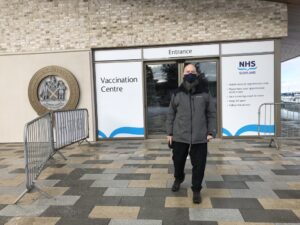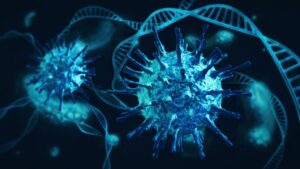A Spring in our Step

Heading in to the NHS Lothian vaccination centre to receive my Pfizer vaccine
Winter is in the past and Spring is nearly with us. The bulbs and leafing trees tell us so. There are reasons to feel a spring in our step. Pupils are heading back to school!
The UK-wide rollout of the vaccine is going remarkably well. We have passed 20 million adults getting their first dose. I had mine on 10th February. What a great day that was! Such a smooth operation thanks to the NHS staff, armed forces and volunteers. I was hoping for the Oxford/AstraZeneca vaccine. It is a great example of the very best of UK science. In recognition, Professor Sarah Gilbert of Oxford University, who led the team behind the vaccine, has been awarded the Royal Society for Arts, Manufactures and Commerce’ (RSA) Albert Medal. Congratulations to her! As it turned out, I was given the Pfizer/BioNTech version. I was perfectly happy. It is a great example of highly innovative EU science.
Both vaccines are very safe and effective. Indeed, by looking at GP and hospital records, the University of Edinburgh and Public Health Scotland colleagues showed that the hospitalisation risk from COVID-19 fell by over 80%, within 4 weeks of getting the first dose. This was true for both the Pfizer BioNTech and the Oxford AstraZeneca vaccine. Great news and beyond reasonable expectation.
Vaccination is the way out of the COVID-19 pandemic. The second dose is important to get maximum protection. For the NHS to cope and avoid another wave, we need as many as possible to get vaccinated. In the meantime, and for some time to come, we need to keep practicing good hygiene and safe behaviour, particularly in crowded indoor spaces.

The last time I attended a large public event was 8th March 2020 at Murrayfield, when Scotland beat France 28-17 at rugby. The final matches in the 6 Nations competition had to be cancelled because of COVID-19. The competition wasn’t concluded until 31st October, 2020. A year on and the competition is under way, but behind closed doors and with the players and coaches in ‘bubbles’ with twice weekly COVID-19 testing. Sadly a minor breach of the ‘bubble’ led to an outbreak in the French camp after their trip to Rome. The match against Scotland scheduled for 28th February, 2021 in Paris had to be cancelled. To quote Sir Jeremy Farrar, head of the Wellcome Trust, ‘until we are all safe, no one is safe’.
The early evidence for the vaccines working relied on the historical excellence of NHS Scotland health records and the ability to track real-time health of the nation, from birth to death. For this same reason, we ask our Generation Scotland volunteers to let us link the information they share with us to their NHS records. Our number one promise is to keep personal volunteer data safe, secure and in confidence.
Thanks to you, we have not only been able to survey how you have been feeling and coping with COVID-19, but also supporting more great science.
We partnered with a team in London and Berlin to see if they could find blood markers of mild or severe COVID-19 infection. They needed samples collected from ill patients and from before the arrival of COVID-19. That’s where we came in. From just a drop of blood they found a group of twenty seven proteins that signalled whether someone was severely affected and needed intensive treatment right away.
 We worked with Dr Kenny Baillie, an ICU consultant in NHS Lothian. Somehow Kenny manages to combine treating the sickest patients with world-class genetics research at the University of Edinburgh. He led an international effort to collect blood samples from many severe cases of COVID-19 as quickly as possible. To look for genetic clues, his team compared over 2,000 cases to many more samples from volunteers who were COVID-19 free. This is where Generation Scotland and many other similar sample collections came into play. Five genes were found to be risk factors for severe illness when infected. One of these makes a protein that is known to be associated with inflammatory disease. There is a drug already in clinical use that can be used to treat people with high levels of this protein. Clinical trials are needed, but there is a good chance this drug could help control severe illness. Read more about this work in the link below.
We worked with Dr Kenny Baillie, an ICU consultant in NHS Lothian. Somehow Kenny manages to combine treating the sickest patients with world-class genetics research at the University of Edinburgh. He led an international effort to collect blood samples from many severe cases of COVID-19 as quickly as possible. To look for genetic clues, his team compared over 2,000 cases to many more samples from volunteers who were COVID-19 free. This is where Generation Scotland and many other similar sample collections came into play. Five genes were found to be risk factors for severe illness when infected. One of these makes a protein that is known to be associated with inflammatory disease. There is a drug already in clinical use that can be used to treat people with high levels of this protein. Clinical trials are needed, but there is a good chance this drug could help control severe illness. Read more about this work in the link below.
Five genes found associated with the most severe form of Covid-19
It is a busy month ahead for the Generation Scotland team. I will be back in April to give you an update. In the meantime, stay safe and help keep others safe too.




Recent comments